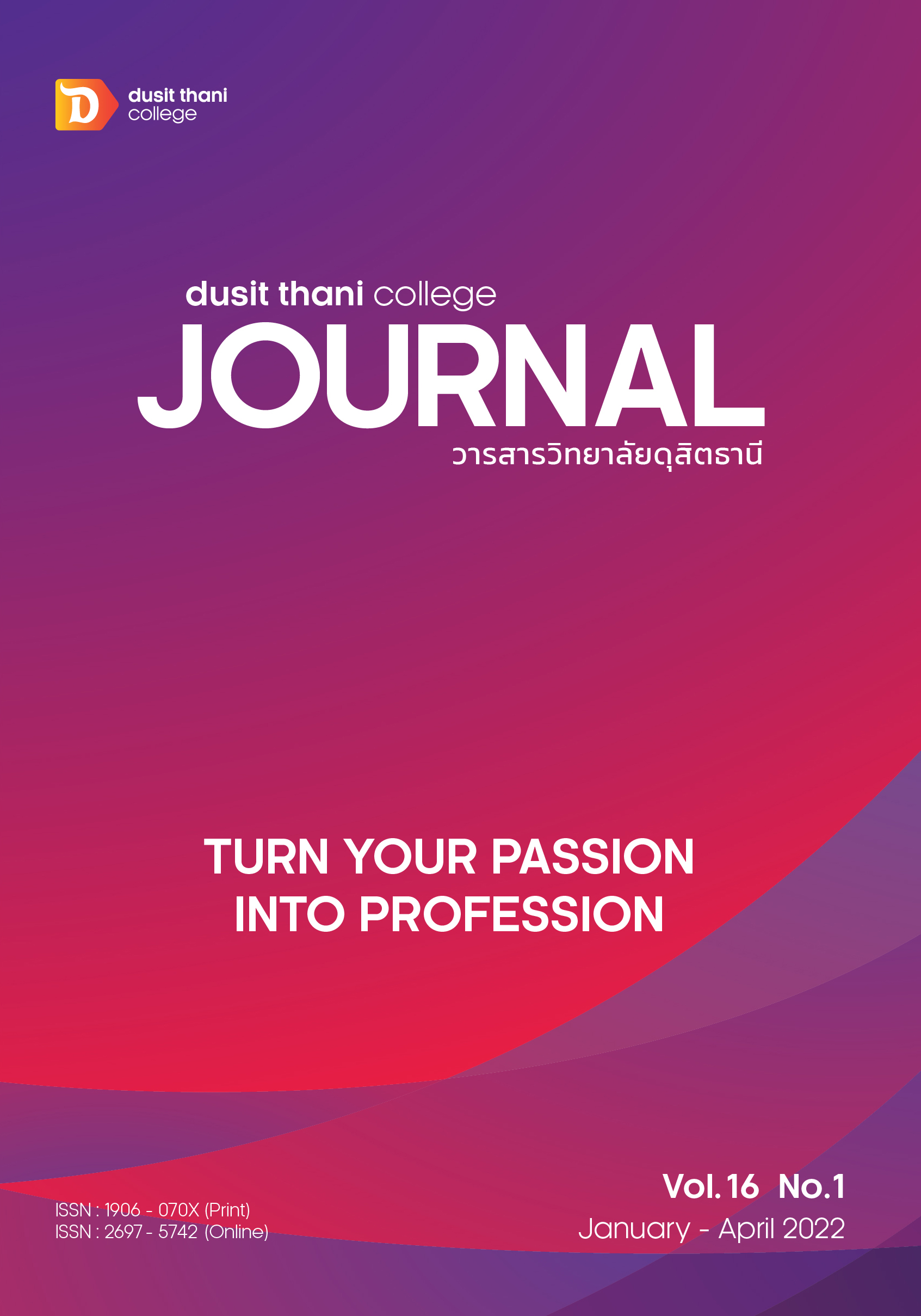Guideline for Human Resource Development of Chef in Restaurant Business
Main Article Content
Abstract
This research aims to study 1) the demand in self-development of the kitchen staff from the Copper Buffet Restaurant, 2) problems in developing the kitchen staff, and 3) the development strategies of the kitchen staff. To collect the data, the questionnaire was distributed to 60 Copper Buffet kitchen staff who have at least 1 year of work experience, and the interview was conducted to a manager and 2 human resource managers.
The statistics used in the data analysis are percentage, mean, standard deviation, independent t-test and one-way ANOVA.
The results showed that the overall demand for the development of the kitchen staff is at a medium level: The kitchen staff development in terms of training is at a medium level, while the highest average score item is an informative lecture on the job description, supervisor, one-on-one training, and flexibility to learn other kitchen stuff; The overall demand for kitchen staff development in terms of education is at a low level, while the highest average score item is receiving specialized training to develop work proficiency; The overall demand for kitchen staff in terms of development is at a low level, while the highest average score item is field trip, followed by the assignment of new challenging tasks. Problems in the development of kitchen staff are at a medium level. The most problematic one is the organization lacking a training department, followed by lecturers having no expertise, knowledge, and skills to provide education to the staff. For the development strategies of the kitchen staff, Copper Buffet Restaurant is managed with highly values personnel development. The employees must have an opportunity to learn both theory and practice which they can practically perform and work across departments in the kitchen.
Article Details

This work is licensed under a Creative Commons Attribution-NonCommercial-NoDerivatives 4.0 International License.
Article Screening Policy
- All research and academic articles to be published must be considered and screened by three peer reviews in the relevant field / article.
- All articles, texts, illustrations and tables published in the journal are the personal opinions of the authors. Editors don't always have to agree. And no responsibility whatsoever is the sole responsibility of the author.
- The articles to be published must never be published. Where did you first publish? And not in the consideration of other journals If the audit found that there has been a duplicate publication It is the sole responsibility of the author.
- Any article that the reader sees as being plagiarized or impersonated without reference. Or mislead the work of the author Please let the journal editor know it will be your greatest blessing.
References
Aporn Phuwitthayaphan. (2550). Career development in practice. Bangkok : HR Center.
Areeya Charoenpoome. (2562). Guideline for the Development of a Training Model Based on the Competency Standards for Guest Service Agents at Four-Five Star Hotels in Bangkok Metropolis MBA Thesis, Dusit Thani College.
Chachawan Ruangpraphan. (2539). Basic Statistics. Khon Kaen: Klang Nana Wittaya Printing.
Dawdeun Lohitpura and Chaiwat Somsri. (2561). Factors Affecting The Resignation of Private Employee Companies in Lampang. Payap University Journal, 28(1), 167-178.
Jarunate Kuapak. (2559). The Personal Potential Development Guidelines of Supporting Staff of Rajamangala University of Technology Rattanakosin. A Thesis of the Requirements for the Degree Master of Arts Program, Silpakorn University.
Jiraporn Thadpinij, Thongprawit Champangern and Prachanan Nilsuk. (2555). Occupational Competency Analysis of Hotel Chefs. Journal of Vacation and Technical Education, 2(4), 50-58.
Jittima Akarathitipong. (2556). Teaching Documentation code 3563404.Human Resource Development. Phranakhon Si Ayutthaya Rajabhat University. Searched on 3 August 2564, from http://www2.feu.ac.th.
Kanyamon Inwang. (2554). Academic Leadership Development Model Affecting the Effectiveness of Academic Administration of Faculty-Level Executives in Private Higher Education Institutions. Dissertation. Faculty of Education Department of Educational Administration and Leadership, Saint John’s University.
Karuna Junhom. (2548). “CHEF’S KNOWLEDGE.” Department of Food an Nutrition, Home Econimics Faculty Rajamangala University of Technology Krungthep South Bangkok Campus.
Kasikorn Research Center. (2563). The restaurant business faces high challenges and changing patterns expected value 4.37 – 4.41 hundred million baht. Searched on 15 January 2564, from https://www.kasikornresearch.com/th/analysis/
kecon/business/Pages/ z3067.aspx
Nadler, L. (1980). Corporate Human Resource Development: A Management Tool. Housto: Gulf.
Ornanong Chwymitr. (2564) Human Resource Development under the Concept of New Public Management: A Case Study of Department of Empowerment of Persons with Disabilities Master of Public Administration, Ramkhamhaeng University. Searched on 3 August 2564, from http://www3.ru.ac.th
Phanporn Kuatan. (2562). Chef behind the Food : A case study of chefs in Bangkok. Individual case studied of the arts Program, Silpakorn University.
Prapatsorn Plabdiwat, Arporn Deenan and Nujaree Chaimongkol. (2560). Problems and Needs of Self-Development among staff of Faculty of Nursing, Burapha University. Faculty of Nursing Journal. Burapha University, 25(4), 21-31.
Thai Chefs Association. (2559). Thai Chefs Association joins with partners to organize the biggest chef competition of the year. Searched on 15 January 2564, from http://positioningmag.com/ tag/ Thai Chefs Association.
Thareethip Taki. (2551). Introduction of Hotel Business and Food Service Business. Pathumthani: Bangkok University.
Thawat Boonyamanee. (2550). Leadership and Change. Bangkok Metropolis : Odeonstore Publishing.
Shai, M. P. (2016), Technical competencies of restaurant managers in Pretoria: Employees’ and managers’ perceptions. African Journal of Hospitality, Tourism and Leisure, 5 (1), 1-12.


